|
|
|
Sort Order |
|
|
|
Items / Page
|
|
|
|
|
|
|
| Srl | Item |
| 1 |
ID:
119065
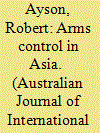

|
|
|
|
|
| Publication |
2013.
|
| Summary/Abstract |
Even if the international mood in favour of steep US and Russian nuclear cuts was to last, it is unlikely to spread to Asia, where nuclear arsenals remain comparatively modest and where regional allies rely on Washington for extended deterrence. This does not render nuclear arms control irrelevant in Asia, where there is a modest but significant tradition based on informal and unilateral restraint rather than formal agreement. But as more of Asia's nuclear programs have come out of the closet and as great power relationships intensify, the region needs to look nuclear arms control more squarely in the eye. For arms control to have real purchase in tomorrow's Asia, China and the USA will need to look beyond their currently asymmetrical relationship and find an understanding based on increased nuclear transparency which also restrains their potentially escalatory competition in advanced conventional war-fighting abilities.
|
|
|
|
|
|
|
|
|
|
|
|
|
|
|
|
| 2 |
ID:
119070


|
|
|
|
|
| Publication |
2013.
|
| Summary/Abstract |
This article is a contribution to the re-evaluation of the formative years of the emergent international relations discipline. Work on this topic, extensive over the past decade and a half, has overturned a number of the foundational myths of the global discipline, especially regarding the period between the two world wars. The literature on international relations in Australia, slow to reflect this re-evaluation, generally still locates the first important developments in the 1960s, and characterises the scholarship that emerged as predominantly 'realist'. This study both pushes back the boundaries and challenges the theoretical perspectives used to categorise thinking in Australia at that time. A student of C. A. W. Manning and thus conversant with British ideas of 'international society', George Modelski's early exposure to theoretical work in the USA and his endeavours to give his department a strongly regional focus gave his work a richness and multifaceted character not easily captured by the 'realist-rationalist' dichotomy. Modelski went on from the Australian National University to become a major figure in international relations in the USA, contributing to the original debates on globalisation and best known for his work on 'long cycles' in world politics.
|
|
|
|
|
|
|
|
|
|
|
|
|
|
|
|
| 3 |
ID:
119069
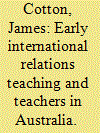

|
|
|
|
|
| Publication |
2013.
|
| Summary/Abstract |
Drawing on the insights of the current literature concerned with the institutions which fostered and supported the emergence of the international relations (IR) discipline, this article reassesses the Australian contribution in the interwar years. From this period, teaching materials and surviving lecture notes, as well as documentation of Australian participation in the International Studies Conference, show that, contrary to the received view, academies and institutions supported a recognisable IR, albeit in its formative stages. Even by the early 1920s there was a developing awareness that 'international relations' was a discrete subject worthy of presentation in a specific curriculum. The Melbourne school initiated by William Harrison Moore exerted the greatest influence; an energetic pioneering effort in Sydney under H. Duncan Hall was not maintained after his departure. Law and history departments offered such courses, though their place in wider programs depended upon the contingencies of personalities and appointments. By the 1930s, IR teachers were familiar with the major methodological debates of the era in the UK and the USA. While consistent attention was devoted to international organisation, and 'collective security' had its champions, the predominant view, in the terminology of the 'first debate', was neither idealist nor realist.
|
|
|
|
|
|
|
|
|
|
|
|
|
|
|
|
| 4 |
ID:
119066
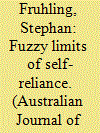

|
|
|
|
|
| Publication |
2013.
|
| Summary/Abstract |
As a close US ally, Australia is often seen as a recipient of US extended deterrence. This article argues that in recent decades, Australian strategic policy engaged with US extended deterrence at three different levels: locally, Australia eschews US combat support and deterrence under the policy of self-reliance; regionally, it supports US extended deterrence in Asia; globally, it relies on the US alliance against nuclear threats to Australia. The article argues that in none of these policy areas does the Australian posture conform to a situation of extended deterrence proper. Moreover, when the 2009 White Paper combines all three policies in relation to major power threats against Australia, serious inconsistencies result in Australia's strategic posture-a situation the government should seek to avoid in the White Paper being drafted at the time of writing.
|
|
|
|
|
|
|
|
|
|
|
|
|
|
|
|
| 5 |
ID:
119071
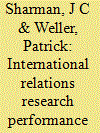

|
|
|
|
|
| Publication |
2013.
|
| Summary/Abstract |
In this research note, the authors briefly report the results of an exercise measuring the relative research performance of Australian universities in the field of international relations (IR). The findings are based on counting articles in the leading journals in the field, as determined by the Excellence in Research Australia (ERA) journal ranking. The authors also present the number of IR scholars in each university according to a 2011 survey. Three issues are addressed: the logic of journal rankings, especially in light of the decision to drop these from the ERA exercise; the method by which the data was compiled; and a discussion of the findings. These results build on and update those reported earlier for the broader discipline of political science, extending to the period 2003-11.
|
|
|
|
|
|
|
|
|
|
|
|
|
|
|
|
| 6 |
ID:
119068
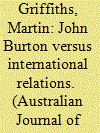

|
|
|
|
|
| Publication |
2013.
|
| Summary/Abstract |
This article explores the intellectual legacy of John Wear Burton, who died in June 2010. Widely lauded as a pioneer in the fields of conflict resolution and peace studies, Burton's legacy in the broader study of international relations (IR) is more ambiguous. The author argues that Burton is best remembered as a critic of IR rather than as a contributor to the discipline, particularly as it evolved from the mid 1980s to the present. Burton's most trenchant criticisms of IR in the 1960s and 1970s were really directed against a superficial version of realism. Burton's work on human needs and conflict resolution, in contrast, has had a more enduring legacy.
|
|
|
|
|
|
|
|
|
|
|
|
|
|
|
|
| 7 |
ID:
119067
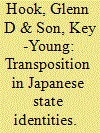

|
|
|
|
|
| Publication |
2013.
|
| Summary/Abstract |
This article aims to illustrate the trajectory of Japan's security identity transposition. As one of the catalysts in identity transposition, it focuses on the constitutive roles of norms regulating Japan's overseas dispatches of the Self-Defense Forces (SDF). Whilst keeping the identities of 'a peace state' and 'a civilian power', the authors argue that Japan has crafted a new security identity after the end of the cold war and the 9/11 terrorist attacks-namely, 'an international humanitarian power'. As evidence of this transposition, the authors illustrate a dramatic increase in the number of overseas SDF dispatches on humanitarian missions, and the shift of domestic and foreign responses to it. The authors note that Japan has been on the road to remilitarisation and internationalisation during the past four decades through the enactments of laws for overseas SDF dispatches, the general public's shift of attitude on the SDF's roles, the evolution of the alliance in a more operational direction, and the creation of threats from North Korea and China. Lastly, the authors argue that there is still a long way to go before Japan emerges as a normal state because of the presence of many domestic and structural barriers, especially multiple identities defining the Japanese state.
|
|
|
|
|
|
|
|
|
|
|
|
|
|
|
|
|
|
|
|
|